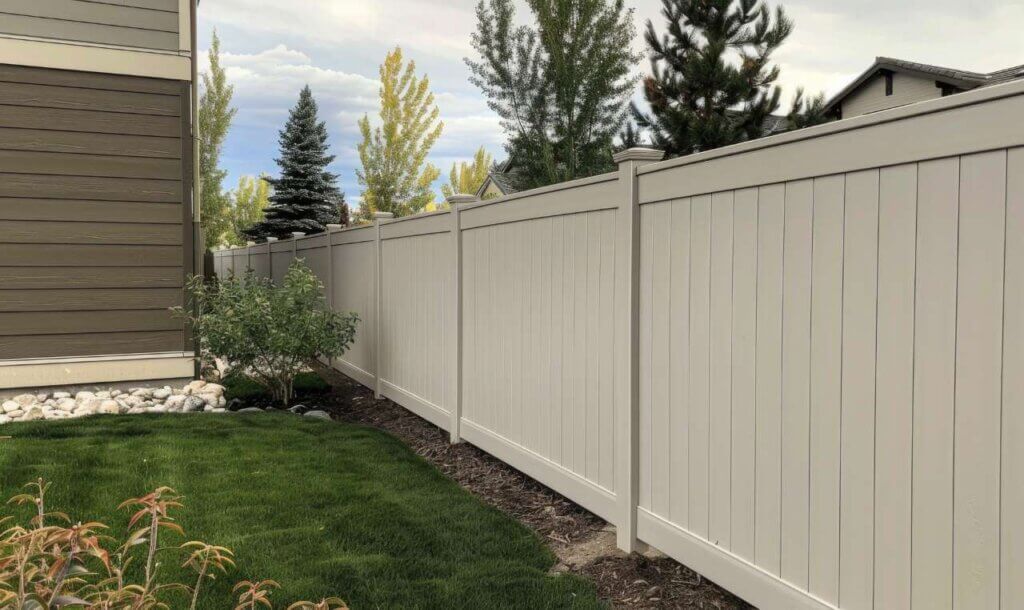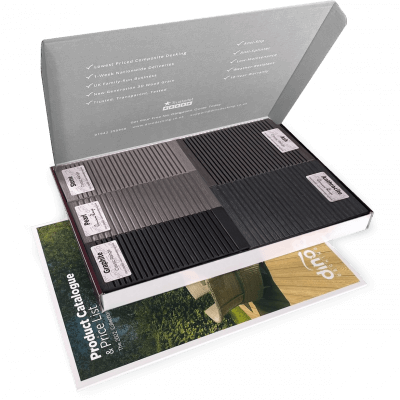5 Composite Decking Lighting Ideas
Our composite decking looks great in any setting, but you can really make your outdoor spaces shine with our decking
Products in Stock
Lowest Prices
Express Delivery
10-Year Warranty
Early April Sale. Up To 15% Off.

If you’re on the fence about which material to choose for your fence and you’re torn between composite and vinyl fencing, you’ve clicked on the right article! After all, both options have their merits, but which one comes out on top for your specific needs and home?
To make it easier for you, we’re going to compare each when it comes to aesthetics, durability, maintenance and security – so, let’s get started and see how they stack up against each other!
First things first, let’s talk about composite fencing. This innovative material is made from a blend of recycled wood fibres and plastic, creating a product that combines the best qualities of both materials. The result? A durable, low-maintenance fencing option that looks like wood but performs like a dream. At Dino Decking, we offer the best composite fence panels in the UK – and we even offer you a free sample to try out first in your garden.
On the other side of the fence (pun intended), we have vinyl fencing. This material is made from PVC (polyvinyl chloride) and is a popular choice for homeowners in the UK. It’s known for its durability and low maintenance requirements, but how does it really compare to composite?
When it comes to durability, both composite and vinyl fencing hold their own, but composite has a slight edge. Composite fencing is engineered to withstand the elements, resisting warping, rotting, and fading much better than traditional wood, and it’s also less likely to crack or become brittle over time compared to vinyl, especially in extreme temperatures.
Vinyl fencing, while durable, can also become brittle in very cold weather and may warp or sag in extreme heat. It’s also more prone to damage from impacts, which can be a consideration if you live in an area of the UK with frequent storms or high winds. (So pretty much all of them, right?)
Both composite and vinyl fencing are low-maintenance options, but again, composite takes the lead. Composite fencing requires little more than an occasional wash with soap and water to keep it looking great, it doesn’t need painting or staining, and it resists mould and mildew growth like a champion.
Vinyl fencing is also relatively low-maintenance, but it can develop mould or mildew if water or damp builds up underneath the surface. It’s also prone to collecting dirt and grime, which can be more noticeable on its smooth surface.

When it comes to initial cost, vinyl fencing often has a lower price point, which we could technically say gives the price advantage to vinyl over composite. However, it’s important to consider the long-term value; composite fencing, while typically more expensive upfront, offers superior durability and longevity, which means you’re likely to save money in the long run on replacements and repairs.
Moreover, composite fencing can add more value to your property due to its high-end appearance and durability, potentially offering a better return on investment if you’re considering selling your home in the future.
Here’s one of the main advantages of composite fencing; composite fencing offers a more authentic wood-like appearance than vinyl, with textures and colours that closely mimic real wood. And at Dino Decking, our composite panels are available in a wide range of colours and styles, so you can find the perfect shade to match your home’s aesthetic.
Vinyl fencing, while available in various styles, often has a more artificial appearance. Its colour options are also typically more limited, and the smooth plastic finish can look less natural in a garden setting.
If you’re environmentally conscious (and who isn’t these days?), composite fencing is the clear winner; most composite fences are made from recycled materials, helping to reduce waste, and they’re also recyclable at the end of their life, which is a big green plus.
Vinyl fencing, on the other hand, is made from PVC, a type of plastic that’s not biodegradable and can be harmful to the environment during production and disposal.
When you weigh up all the factors – durability, maintenance, long-term cost, aesthetics, and environmental impact – composite fencing comes out on top as the superior choice. And while vinyl fencing has its merits, composite simply offers a combination of benefits that’s hard to beat.
So, if you’re looking for a fencing solution that offers the best of all worlds – beauty, durability, low maintenance, and environmental responsibility – composite fencing is the way to go. Why compromise when you can have it all? Your future self (and your garden) will thank you for making the smart choice.
Ready to explore the world of composite fencing? We’re here to help you find the perfect solution for your home. Get in touch with us today, and let’s make your fencing dreams a reality!

Our sample pack contains a sample piece of each colour currently available. Order your free sample pack today to compare the colours and get a true feeling of the Dino Decking range!
Our composite decking looks great in any setting, but you can really make your outdoor spaces shine with our decking
If the idea of having rats under your decking makes you shiver, don’t worry. We’ll let you know the signs
Business hours
Monday: 09:00 – 17:30
Tuesday: 09:00 – 17:30
Wednesday: 09:00 – 17:30
Thursday: 09:00 – 17:30
Friday: 09:00 – 17:30
Saturday: Closed
Sunday: Closed
Contact us
01942 355968
support@dino.co.uk
Collection Address: Unit 1 Wetheral Close Hindley Ind Estate Wigan Greater Manchester North West WN2 4HS
Pages
Products
Testing
Copyright 2025 Dino Decking Ltd All Rights Reserved.
VAT Number: GB296097848.
Company Number: 10837233.